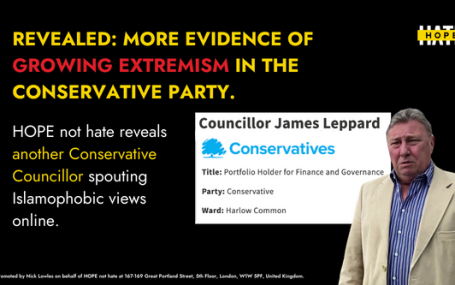HOPE not hate uses cookies to collect information and give you a more personalised experience on our site. You can find more information in our privacy policy. To agree to this, please click accept.
The long awaited definition for Islamophobia in the UK is here and Muslim organisations across the UK are calling on political party leaders to adopt it.
The All Party Parliamentary Group (APPG) on British Muslims concluded in ‘Islamophobia Defined’ that it is not just British Muslims who are impacted by Islamophobia, but British society at large. It defines the term as:
“Islamophobia is rooted in racism and is a type of racism that targets expressions of Muslimness or perceived Muslimness.”
Islamophobia is still a relatively new word, appearing to the British public around two decades ago with the publishing of a seminal 1997 Runnymede Trust report. It defined Islamophobia then as “a useful shorthand way of referring to dread or hatred of Islam — and, therefore, to fear or dislike of all or most Muslims.”
Lord Bourne of Aberystwyth says in the new report that “previous attempts by others to define this term have not succeeded in attracting consensus or widespread acceptance”. The breadth of the inquiry, based on two years of consultation and submissions from academics, activists, and members of the UK Muslim community, was the result of failed efforts in the past to develop a definition.
During the launch on 27 November, Labour MP for Ilford North Wes Streeting said he hoped the report was a “call to action” and mentioned a future roadmap to push the definition forward.

At the launch of ‘Islamophobia Defined’, equalities campaigner Akeela Ahmed shared some of the threats and hate she has received, most often online, including orders to “go back to Muslimstan”.
She added that the lack of an agreed definition had been “a hindrance for agencies, schools, businesses and universities that want to tackle Islamophobia” because “how can they do this if there is no definition of what we are trying to stop?”
The report and the definition show it is not only Muslims who suffer Islamophobia, but anyone perceived to be Muslim, including other minorities.
Speaking at the launch, Baroness Sayeeda Warsi said: “This is not about Islam or even Muslims, it is about people. The people facing hate are Muslim women, they are converts considered traitors or Sikhs assumed to be Muslim.”
Warsi admitted that she was initially sceptical of using the term (instead of anti-Muslim prejudice).
“We all started the report in very different places, but there were a lot of former lawyers on the team so we wanted to follow the evidence.”
The APPG received an overwhelming amount of evidence from governmental, community, academic and public and private sectors that desired to retain the term. Reasons ranged from the fact that the term had established itself in public and political discourse, had gained traction over time and was the predominant choice among Muslims to name and describe the hatred and hostility targeted at them on the basis of their Muslimness.
The term Islamophobia has long generated detractors who consider it either a cover for banning criticism of the religion or illogical as it implies an irrational fear. But countering Islamophobia is not about curtailing free speech or limiting criticism of the faith. It is about ensuring a minority community is not stigmatised, discriminated against, or suffering hate crimes.
Writers like Melanie Philips claim that Islamophobia is “fiction” but the figures from the Metropolitan police and Tell MAMA show a different story.
The working definition is however, only a recommendation, and while Warsi was optimistic about the government adopting it, it has yet to do so.
Councils of mosques, charities, Muslim organisations and networks have now co-signed open letters to all political party leaders urging them to adopt the APPG definition of Islamophobia.

Cllr James Leppard expressed Islamophobic sentiments and endorsed abuse of Sadiq Khan HOPE not hate can reveal further evidence of the growing problem of extremism…